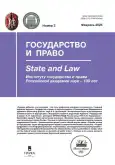The legislative and judicial framework for the administrative control authorities in Jordan: what are the risks of social networks on elements of public order?
- Authors: Al-Billeh T.1, Abu Issa H.1
-
Affiliations:
- Applied Science Private University
- Issue: No 2 (2025)
- Pages: 144-153
- Section: Abroad
- URL: https://journal-vniispk.ru/1026-9452/article/view/285441
- DOI: https://doi.org/10.31857/S1026945225020144
- ID: 285441
Cite item
Abstract
The study analyzes the concept of administrative control and the distinction between administrative and judicial control authorities. That the objectives of administrative control have expanded to include other elements that fall within the moral aspect of the idea of public order will also be shown. The role of the administrative judiciary in distinguishing between administrative decision and judicial work, and the dangers of social networks on the elements of public order represented by public security, public health, public tranquility, ethics and public morality will be explained as well. The widespread use of social networking sites such as Facebook, Twitter, Instagram, and WhatsApp has led to a major revolution that has left its effects on all aspects of life, including the public order of countries, which is facing new challenges and threats. The study proved that the concept of administrative control according to jurisprudential trends differs from the legal and judicial concept. It was found that the jurisprudential definitions of administrative control were more comprehensive and general than the legislative and judicial definitions. However, there is a need to expressly stipulate the dangers of social networks that affect the elements of public order, represented by public security, public health, public tranquility, public morality and ethics.
Full Text
About the authors
Tareq Al-Billeh
Applied Science Private University
Author for correspondence.
Email: t_billeh@asu.edu.jo
ORCID iD: 0000-0001-7171-6004
Assistant Professor, PhD (Public Law), Faculty of Law
Jordan, AmmanHamza Abu Issa
Applied Science Private University
Email: h_abuissa@asu.edu.jo
ORCID iD: 0000-0002-4543-3702
Associate Professor, PhD (Criminal Law), Faculty of Law
Jordan, AmmanReferences
- Abdel Raouf Bassiouni. Theory of Administrative Control in Contemporary Positive Systems and Islamic Law. Alexandria, 2007.
- Al-Abadi Muhammad. Al-Wajeez in the administrative judiciary. Al-Mafraq, 2004.
- Al-Ahmadi Wajdi. Judicial oversight of the work of the administrative control authorities // Arab Journal for Scientific Publication. 2021. No. 1 (30). Pp. 426–456.
- Al-Amili Siriy. Judicial control over administrative control procedures in exceptional circumstances (a comparative study) // Journal of Education College Wasit University. 2022. No. 48 (3). Pp. 469–496.
- Al-Helou Majid. Administrative Law. Alexandria, 1996.
- Al-Ghazoui Muhammad (2005). Al-Wajeez in the political and constitutional organization. Amman.
- Al-Thunaibat Muhammad (2003). Al-Wajeer in Administrative Law. Amman.
- Barakatiat Suead, Faraq Saeid, Zumuli Naeima. First Minister’s administrative control powers in maintaining public order of the State “Practical applications to combat corona virus model” // Journal of Law and Human Sciences. 2023. No. 16 (1). Pp. 799–823.
- Bosoul Omar. Explanation of the crime prevention law. Amman, 2008.
- Bukhari Ali, Taytus Fathi. The role of administrative control authorities in maintaining public health (Corona Covid 19 virus as a model) // Journal of the Researcher for Legal and Political Studies. 2022. No. 6 (3). Pp. 1244–1258.
- Ehab Khalifa. Electronic Power: How Can States Manage Their Affairs in the Age of the Internet? Cairo, 2016.
- Fahmy Mustafa. Administrative judiciary. Cairo, 1979.
- Hafez Mahmoud. Administrative decision. Cairo, 1991.
- Ibrahim Yama. Administrative control powers and means of exercising them in the Algerian legal system // Journal of Ijtihad for Legal and Economic Studies. 2012. No. 1 (1). Pp. 113–137.
- Kamoon Hussein. On the specificity of judicial procedures related to disputes of the legality of decisions of independent police authorities in Algeria // Journal of Ijtihad for Legal and Economic Studies. 2022. No. 11 (1). Pp. 482–502.
- Khalaf Khaled. Judicial oversight of the work of the independent administrative control authorities. Master Thesis. Muhammad Al-Siddiq Bin Yahya University, 2012. URL: http://dspace.univ-jijel.dz:8080/xmlui/handle/123456789/9822
- Layla Muhammad. Political systems. Beirut, 1969.
- Maamari Al-Masoud & Dabih Zahira. The limits and controls of the control authorities as a guarantee to protect public freedoms // Journal of Human Sciences. 2022. No. 22 (2). Pp. 145–163.
- Miloud bin Abdel Aziz. Moral and pornographic crimes via the Internet and their impact on society from a Sharia and legal perspective // Al-Wahat Journal for Research and Studies. 2012. No. 17. Pp. 164.
- Muhamma Hassouna. Administrative Control and its Impact on Public Freedoms. Alexandria, 2014.
- Shatnawy Ali. Encyclopedia of Administrative Judiciary. Part One. Amman, 2004.
- Shawa Mahmoud. Criminal Administrative Law. Cairo, 2009.
- Shebeisheb Abdel-Wahhab. Judicial control over (administrative) control authorities. Master’s thesis, Mohamed Boudiaf University. Algeria, 2018.
- Sorour Ahmad. Constitutional Criminal Law. 4th ed. Cairo, 2007.
- Tamawi Suleiman. Al-Wajeez in Administrative Law. Cairo, 1996.
- Tamawi Suleiman. The general theory of managerial decisions. Cairo, 1977.
- Tricky Hassan. Security Threats Related to Bad Uses of Social Media // Journal of Law and Political Science. 2014. No. 19. URL: https://search.emarefa.net/detail/BIM-660849
- Wassim Shafiq Al-Hajjar. The legal system for social media (WhatsApp, Facebook, Twitter): A comparative legal study on privacy, personal freedom, responsibility and jurisdiction. Beirut, 2017.
- Yassin bin Brih. Administrative Control in the Thought of Positive Law and Islamic Sharia. Alexandria, 2014.
- Youssef Al-Dhafiri. Administrative control and the limits of its powers in the circumstances normal and extraordinary circumstances // Journal of legal and economic research. 2020. No. 74. Pp. 1498–1549.
- Zaina Ait Ouazou. A Critical Study of Independent Regulatory Authorities // The Legitimacy of Independent Regulatory Authorities. Constitutional Court Journal. 2018. No. 6 (2). Pp. 11–28.
- Ziyad Adel & Belkhair Draghi. The limits of administrative control authorities to protect individual rights and freedoms // Journal of Legal and Political Sciences. 2019. No. 10 (2). Pp. 1424–1441.
Supplementary files










